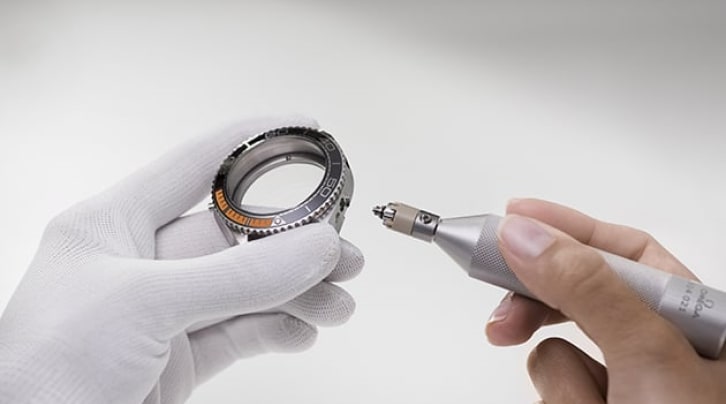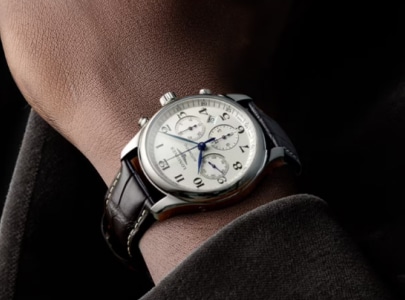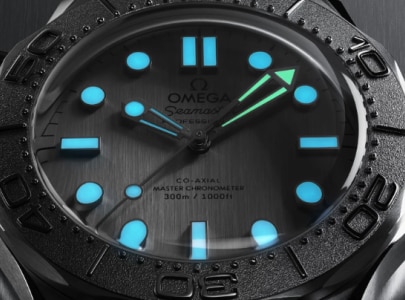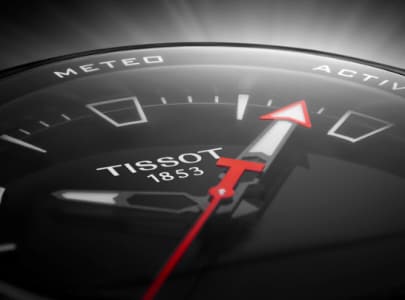We highly recommend taking great care of your timepiece to prevent it from getting damaged and to extend its lifespan. This goes for all watch types, whether classic or diving, mechanical or quartz. Of course, most watches are robust enough to withstand everyday activities and you don’t need to handle your watch like porcelain. If you want to avoid having (potentially costly) repair work done or running into technical problems, however, you should protect your watch from the damaging effects of time and above all, prevent the movement and the watch face from rusting.
This can be done simply by being careful. If you have any worries at all, especially about the water tightness of the casing, go straight to your watchmaker. The casing of your watch won’t necessarily be water-resistant forever, so have a professional test it regularly. We recommend doing this every time you go for a watch revision, even if it’s just to have the battery changed (incidentally, once a watch battery dies, you shouldn’t leave it for too long otherwise it could damage the movement).
If you have a mechanical watch, you have a bit more work on your hands because these have to be worn regularly to keep the oil on the movement from solidifying. The same goes for automatic watches. If the watch stops because it isn’t being worn, the movement loses its amplitude and consequently, becomes less precise. The best solution in this case is to take your watch to a watchmaker to have it adjusted. This is also the best thing to do if your watch suddenly appears to be too fast or slow, which is a sure sign of magnetic interference. Your watchmaker should be able to fix this problem relatively easily without opening the watch.
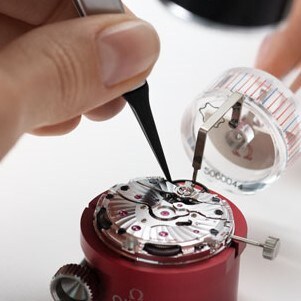 Bear in mind that just like a car, a watch must be checked over regularly by a professional, even if it hasn’t stopped working. At least once every five years, have a general revision carried out, including opening of the case, disassembly of the movement, checks and cleaning of each component, replacement of any pieces that have become worn down, application of oil to the movement, checks on the hands and finally, replacement of the waterproof seals. Once the casing is closed again, the watchmaker can carry out a general check of the watch’s performance and any complications. These checks take care of the functional side of things.
Bear in mind that just like a car, a watch must be checked over regularly by a professional, even if it hasn’t stopped working. At least once every five years, have a general revision carried out, including opening of the case, disassembly of the movement, checks and cleaning of each component, replacement of any pieces that have become worn down, application of oil to the movement, checks on the hands and finally, replacement of the waterproof seals. Once the casing is closed again, the watchmaker can carry out a general check of the watch’s performance and any complications. These checks take care of the functional side of things.
To keep your watch looking nice, you can have the glass or case polished, although this won’t affect the functionality of your watch.
Take extra care if you have a vintage model. Usually these kinds of watches have to be sent back to the respective manufacturer’s workshop for any revisions. There, old parts can be replaced if necessary by new, more efficient ones. You should also take the necessary precautions if you want to keep old components. Believe it or not, the moving parts that make up the mechanism can get worn out from rubbing against each other, producing small particles that can block the movement. The lubricant used to oil the cogs also dries out over time, which can affect the performance and functions of your watch.
Have your watch checked regularly by a professional to put your mind at rest if you’re worried about an important or expensive component breaking. Bear in mind that most revisions and maintenance work can be carried out relatively quickly, but the more complex and refined your timepiece is, the longer and more expensive the revision will be. Checking certain functions of certain watch brands can take several weeks, and that’s without counting time for transport and logistics if these checks have to be carried out in Switzerland in the original workshop.
